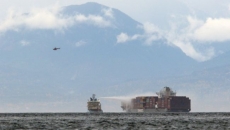A new analysis warns that Canada's major cities are struggling to keep their transit systems running, and says public transit is heading for a "downward spiral" unless major new streams of operating revenue open up.
In a report published in late May, Leading Mobility Canada said the $120-billion in expansions planned for those transit systems won't help cities that are struggling to keep the buses and trains running at current levels.
David Cooper, the principal at Leading Mobility and the study's co-author, said the majority of transit is funded through passenger fares and property taxes, and cities have very limited options for other sources of revenue.
The federal government is allocating billions to expand transit.
"It's great we're getting these investments, but you actually can't materialize the benefits of these investments if the cities actually can't afford to run it," he said.
The analysis looked at the budgets, revenue sources and long-term plans for eight transit systems in Vancouver, Calgary, Edmonton, Winnipeg, Ottawa, Toronto, Montreal and Halifax.
Most of them are already reporting budget shortfalls.
Calgary's shortfall was $33 million in 2023, the same year Toronto reported a $366-million gap. Montreal anticipates its budget shortfall will exceed $560 million in 2025 and grow to $700 million by 2028.
Halifax expects it will be up to $22 million short in 2026 — more than 15 per cent of its total transit budget — while Vancouver warns of a structural deficit of $600 million by the same year.
All of them say the planned expansions, such as new light rail lines in Ottawa, bus rapid transit in Halifax and subway expansions in Toronto, will incur operating costs well above what they can afford.
Vancouver estimated bus and light rail expansions will cost $1.2 billion extra. Calgary said in 10 years its operating budget will be $127 million higher.
Edmonton says by 2033 its budget deficit will grow to $174 million a year, while Winnipeg thinks its expansion plans will add $37 million in annual costs.
The provinces and federal government are only offering limited operating funding to go with the growth, and even that is temporary. For example, Ontario has agreed to provide $1.2 billion to help Toronto run two new LRT lines for a three-year period.
In late July, Vancouver's TransLink warned that it will have to make significant service cuts if its structural deficit isn't solved, including cancelling 145 of its 245 bus routes and reducing service on the SkyTrain and SeaBus. The result would push more than half a million people out of walking distance from a transit stop or station.
On Aug. 8, Ottawa Mayor Mark Sutcliffe sounded the alarm about a "transit crisis" because of a $9-billion hole in OC Transpo's long-range financial plan including the opening of the nearly $5 billion second phase of light rail.
"It’s nice to dream of building more light rail but we don’t even have the money we need to operate our existing system," Sutcliffe said. "If we don’t get the help we need, it won’t even make financial sense to open Phase 2 of light rail. We’d be better off from a financial perspective not to open and run the system."
The report makes clear that COVID-19 hastened some of the structural funding problems plaguing transit systems, when work-from-home policies took a massive bite out of ridership. Leading Mobility said before COVID-19, passenger fares covered an average of 59 per cent of the costs of transit in Canada, far higher than the 38 per cent in the United States.
By 2023, fares covered as little as 23 per cent of costs in Ottawa and as much as 43 per cent in Toronto. Most cities have seen ridership return — though not quite to pre-pandemic levels — but people are using the system differently, with fewer people buying monthly passes, and in some places, more using subsidized transit passes or tickets.
Property tax is most often the second-biggest source of revenue for public transit but inflation and affordability have put massive pressures on cities and there is limited ability for transit to get more money from property taxes.
Vancouver's TransLink gets a share of gas tax funding, but with B.C. drivers adopting electric vehicles more rapidly than anywhere else, that funding source is shrinking fast. Gas tax revenues were down $34 million in 2023 from the year before.
Halifax has a benefit area tax, a surtax on properties located within a certain distance of transit, which in 2023 accounted for almost half its total revenues, or $58.6 million.
Montreal gets about five per cent of its operating revenue from a vehicle registration levy.
Vehicle levies and benefit taxes are among the suggestions the Leading Mobility report makes for cities. It also suggests considering a tax on electric vehicle charging, or adding congestion pricing that taxes vehicles in the busiest parts of cities, similar to what's in place in London and New York City.
The report calculated what may work best in each jurisdiction but also notes that many cities need permission from their provincial governments for such changes. It recommends provinces make legislative changes to allow transit systems to raise new money.
The report also calls for a national commission on transit operating funding, bringing together provinces and municipalities to determine the best way to save their systems.
Cooper said cutting service is a death knell because people will only use transit if it is reliable and affordable. If ridership drops, revenues drop, and then more cuts follow.
Marco D'Angelo, president of the Canadian Urban Transit Association, said he feels there is a will to solve this problem and it is not insurmountable. He noted that when ridership plummeted during the pandemic, federal and provincial governments stepped up to help.
"We had leadership when it was needed to keep Canada's transit systems running," he said. "This is a different scenario, but it was handled before by provinces and the federal government recognizing the national importance of public transit."






